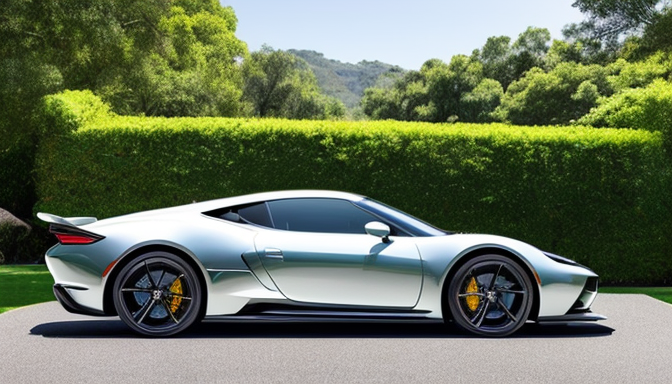Have you ever found yourself daydreaming about that sleek sports car or the luxurious SUV that seems to whisper your name? You’re not alone! Dream cars often symbolize more than just a mode of transport; they represent freedom, status, and a sense of personal achievement. But before you rush to the dealership, it’s crucial to weigh the emotional allure against the practical realities. Is the thrill of owning your dream ride worth the price tag? Let’s dive in!
For many, dream cars evoke a rush of excitement and nostalgia. They can remind us of our childhood fantasies or signify a milestone achieved. When you slide behind the wheel of your dream car, it’s not just about the engine roar; it’s about the adventure that awaits. Think of it as a ticket to freedom—a way to escape the mundane and embrace the extraordinary. But, as enchanting as these vehicles are, we must consider if that emotional satisfaction can outweigh the financial burden.
Now, let’s talk numbers. Owning a dream car can be exhilarating, but it comes with a price. From insurance premiums to maintenance costs, the financial implications can be significant. Here’s a quick breakdown:
| Cost Factor | Details |
|---|---|
| Purchase Price | Initial investment can be substantial, often requiring financing. |
| Insurance | High-performance vehicles typically have higher insurance rates. |
| Maintenance | Luxury cars may require specialized services, increasing upkeep costs. |
| Depreciation | Many dream cars lose value quickly, impacting resale potential. |
In conclusion, while the allure of a dream car is undeniable, it’s essential to assess whether the emotional rewards justify the costs involved. Are you ready to take the plunge, or will you keep dreaming?
The Emotional Appeal of Dream Cars
Dream cars are more than just a mode of transportation; they symbolize freedom, status, and a sense of personal achievement. Think about it—when you picture your dream car, what feelings rush through you? Excitement? Pride? For many, these vehicles represent the pinnacle of success, a tangible reward for hard work and dedication. They ignite a passion that goes beyond the mere mechanics of driving.
Imagine cruising down a scenic highway, the wind in your hair, your favorite song blasting from the speakers. That’s the allure of a dream car! It’s not just about getting from point A to point B; it’s about the experience and the memories you create along the way. Owning a dream car can turn mundane errands into thrilling adventures. It’s like having a piece of art that you can also drive, showcasing your personality and style to the world.
However, the emotional connection to these cars can often cloud judgment. While the thrill is undeniable, it’s crucial to also consider how this dream aligns with your life goals. Here are a few points to ponder:
- Does this car truly reflect who you are?
- Will it enhance your lifestyle or just serve as a status symbol?
- Are the emotional benefits worth the financial investment?
In the end, the emotional appeal of a dream car is powerful, but it’s essential to balance that with practical considerations. After all, it’s not just about the ride; it’s about the journey!

Financial Considerations of Owning a Dream Car
Owning your dream car isn’t just about the thrill of the ride; it’s also a serious financial commitment. Before you take the plunge, it’s essential to weigh the costs involved. Sure, that sleek sports car or luxurious SUV might make your heart race, but have you considered the hidden expenses? From insurance premiums to maintenance fees, these costs can add up quickly.
Let’s break it down a bit. The initial purchase price is just the tip of the iceberg. You also need to account for:
- Insurance: High-performance vehicles often come with hefty insurance premiums.
- Maintenance: Luxury cars may require specialized service, which can be pricey.
- Fuel Costs: Performance cars can be less fuel-efficient, impacting your budget.
- Depreciation: Some cars lose value faster than others, affecting your long-term investment.
To give you a clearer picture, let’s consider a hypothetical example of a dream car purchase:
| Item | Estimated Annual Cost |
|---|---|
| Insurance | $1,200 |
| Maintenance | $800 |
| Fuel | $1,500 |
| Depreciation | $3,000 |
In total, you’re looking at around $6,500 annually, just to keep that dream alive. Is it worth it? That’s a question only you can answer, but being informed about these financial considerations will help you make a decision that aligns with both your passion and your budget.
Frequently Asked Questions
- What is a dream car?
A dream car is more than just a vehicle; it’s a symbol of aspiration, freedom, and personal achievement. It’s that car you’ve always envisioned yourself driving, representing your unique style and ambitions.
- Are dream cars worth the investment?
While dream cars can be pricey, their value often goes beyond financial metrics. They can provide immense emotional satisfaction and a sense of accomplishment, but it’s essential to consider the total cost of ownership, including maintenance, insurance, and potential depreciation.
- How do I know if I can afford my dream car?
Assessing your budget is key! Factor in not just the purchase price, but also ongoing costs like fuel, insurance, and repairs. A good rule of thumb is to ensure that your car expenses don’t exceed 15% of your monthly income.
- What are some tips for maintaining a dream car?
Regular maintenance is crucial! Keep up with oil changes, tire rotations, and other routine checks. Additionally, consider investing in a quality car cover and parking it in a garage to protect it from the elements.